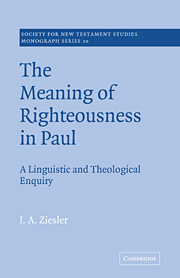Book contents
- Frontmatter
- Contents
- Preface
- Abbreviations
- Introduction
- 1 The Old Testament
- 2 Greek Usage of δíκαιος and cognates
- 3 Later Judaism I: the Septuagint
- 4 Later Judaism II: Intertestamental writings
- 5 Later Judaism III: Philo and Josephus
- 6 Later Judaism IV: The Rabbinic writings
- 7 The New Testament apart from the Pauline corpus
- 8 Paul: Philippians, Colossians, Thessalonians, Ephesians, the Pastorals, and Corinthians
- 9 Righteousness in Christ
- 10 Galatians
- 11 Romans
- Conclusion
- Appendix I Antonyms
- Appendix II The Apostolic Fathers
- Bibliography
- Index of passages cited
- Index of authors
- Frontmatter
- Contents
- Preface
- Abbreviations
- Introduction
- 1 The Old Testament
- 2 Greek Usage of δíκαιος and cognates
- 3 Later Judaism I: the Septuagint
- 4 Later Judaism II: Intertestamental writings
- 5 Later Judaism III: Philo and Josephus
- 6 Later Judaism IV: The Rabbinic writings
- 7 The New Testament apart from the Pauline corpus
- 8 Paul: Philippians, Colossians, Thessalonians, Ephesians, the Pastorals, and Corinthians
- 9 Righteousness in Christ
- 10 Galatians
- 11 Romans
- Conclusion
- Appendix I Antonyms
- Appendix II The Apostolic Fathers
- Bibliography
- Index of passages cited
- Index of authors
Summary
The importance of both justification and righteousness is reflected in the number of occurrences: 14 for the verb, 7 for the adjective, 34 for δικαιοσúνη, 2 for δικαíωσις, 5 for δικαíωμα, plus one instance of δικαιοκρισíα. Once again, as we have a sustained argument, we take the cases seriatim.
ROMANS I. 17
As we have already noted above (pp. 9–14, 170), the meaning of δικαιοσúνη θεοũ here is being widely discussed at the present time. On the basis of what has been discovered in the foregoing, some things can be said at once. First, unless we are to remove Paul altogether from the Jewish tradition, we cannot talk about righteousness as an attribute of God. In the Hebrew tradition, early and late, God's righteousness is the way he acts, and notably the way he acts in maintaining the covenant. It is his activity-inrelationship, and therefore to call it an attribute is inappropriate, if by ‘attribute’ we mean a description of God as he is in himself. The Biblical tradition in general shows no interest in this, but in God as he acted in creation, history, and redemption. Second, we cannot accept that there is any one meaning of ‘righteousness of God’. It is not a formula in the sense of a recognised phrase for a consistent notion, having a specific and unchanging content. All we can do is examine a given text, trying to determine from it and its context, which interpretation, or even combination of interpretations, best fits all the facts.
- Type
- Chapter
- Information
- The Meaning of Righteousness in PaulA Linguistic and Theological Enquiry, pp. 186 - 211Publisher: Cambridge University PressPrint publication year: 1972



